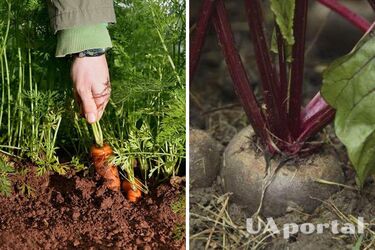How to plant and care for carrots and beets so that they bear sweet fruit

Gardeners often complain about the unpleasant taste of root vegetables, such as carrots and beets. However, it is necessary to know that in addition to the preservation of the crop, there are several other important factors that can affect the taste of these vegetables. Learn how to grow root crops without a bitter taste in our material.
Read also: When and how to plant grapes to get an incredible harvest: advice from summer residents
Experienced gardeners recommend avoiding applying organic fertilizers under beets and carrots. Manure, which contains an increased amount of nitrogen, can give root crops an unpleasant iodine taste. As a result, beets can grow lumpy, and dirty red with white veins, and carrots can have an unnatural red color.
In addition, it is important to plant root crops only in open sunny areas, which should rest for 3-4 years. If peas, early cabbage, potatoes, cucumbers, or onions were previously grown on the plot, this is an excellent option, since these vegetables can be harvested quite early, which makes it possible to apply all the necessary fertilizers to the soil.
The reaction of the soil is also of great importance for the taste of root crops. They require a neutral reaction of the soil solution. If the soil is acidic, it can be neutralized with lime.
It is also important to feed root crops. During the period of growth of root crops in the summer (from July to August), it is recommended to fertilize the plants with nitroammophos. To do this, you can dissolve 30-40 gr. fertilizers in 10 liters of water and pour under the roots of the plants. You can also use complex mineral fertilizers with a rich content of potassium, phosphorus, and other necessary trace elements.
Read also: You need a lot of suns: how to grow tomatoes in pots at home
In addition, another important factor for obtaining root crops with a pleasant taste is timely harvesting. Harvesting of root crops should be done on time, without allowing over-ripening or change. This allows you to preserve the delicious taste and the absence of bitterness in root vegetables.
It is also worth noting that the type of root crop can also affect its taste. When choosing seeds for planting, you should pay attention to the properties of the variety, its resistance to diseases and yield, as well as the description of taste qualities.
In general, growing root vegetables without bitter taste requires attention to several factors such as fertilizer selection, soil response, plant nutrition, timely harvesting, and selection of suitable varieties. By following these tips, gardeners can get a harvest of tasty, juicy, and no-bitter root vegetables, such as carrots and beets, which will be a real delight for the whole family.
We will remind you that in the spring the sowing season begins, nature revives, and insects return with it. Some of them, such as ants, can harm your plants, so they must be dealt with. How to do it, read in our material.
If you want to receive the latest news about the war and events in Ukraine, subscribe to our Telegram channel!
